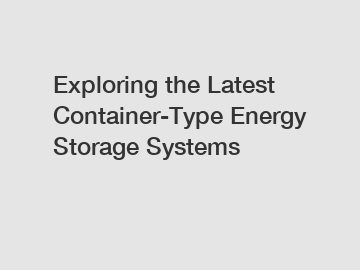Exploring the Latest Container-Type Energy Storage Systems
Exploring the Latest Container-Type Energy Storage Systems.
In recent years, the demand for renewable energy sources has been on the rise as the world shifts towards a more sustainable future. One of the key challenges faced by renewable energy sources such as solar and wind power is their intermittency. Energy storage systems play a crucial role in overcoming this challenge by storing excess energy generated during periods of high production and releasing it when needed. Container-type energy storage systems have emerged as a convenient and efficient solution to meet this growing demand. Let's take a closer look at the latest developments in container-type energy storage systems.
Benefits of Container-Type Energy Storage Systems .

Container-type energy storage systems offer several advantages over traditional energy storage solutions. One of the key benefits is their modular design, which allows for easy scalability. This means that additional storage capacity can be added as needed, making them suitable for a wide range of applications, from residential to industrial settings.
Another advantage of container-type energy storage systems is their mobility. The containerized design allows for easy transportation and installation, making them ideal for temporary or remote applications. This flexibility makes them particularly well-suited for off-grid applications or emergency backup power systems.
Furthermore, container-type energy storage systems are typically pre-engineered and pre-fabricated, which reduces installation time and costs. This plug-and-play approach also simplifies maintenance and upgrades, minimizing downtime and ensuring reliable performance.
Latest Innovations in Container-Type Energy Storage Systems.
Advances in technology have led to the development of more efficient and cost-effective container-type energy storage systems. One of the latest innovations is the use of lithium-ion batteries, which offer higher energy density, faster charging capabilities, and longer cycle life compared to traditional lead-acid batteries. This makes them well-suited for high-power applications and enables a more compact and lightweight design.
Another emerging trend in container-type energy storage systems is the integration of smart controls and monitoring systems. These systems allow for real-time monitoring of energy production and consumption, as well as remote operation and diagnostics. This level of automation improves system efficiency, optimizes performance, and enhances overall reliability.
Additionally, some container-type energy storage systems are designed to be grid-connected, enabling them to participate in energy markets and provide grid services such as frequency regulation and peak shaving. This not only benefits the system owner by generating additional revenue but also helps support grid stability and reliability.
Conclusion.
Container-type energy storage systems offer a versatile and efficient solution for storing excess energy generated by renewable sources. Their modular design, mobility, and pre-engineered construction make them an attractive option for a wide range of applications, from residential to industrial settings. With the latest innovations in lithium-ion batteries and smart controls, these systems are becoming more reliable, cost-effective, and environmentally friendly than ever before. As the demand for renewable energy continues to grow, container-type energy storage systems are poised to play a key role in shaping the future of sustainable energy.
Contact us for more information on the latest container-type energy storage systems and how they can benefit your energy needs.
Are you interested in learning more about pouch lithium battery pack assembly line, prismatic lithium battery laser welding machine, pouch lithium battery assembly line? Contact us today to secure an expert consultation!

Comments
0